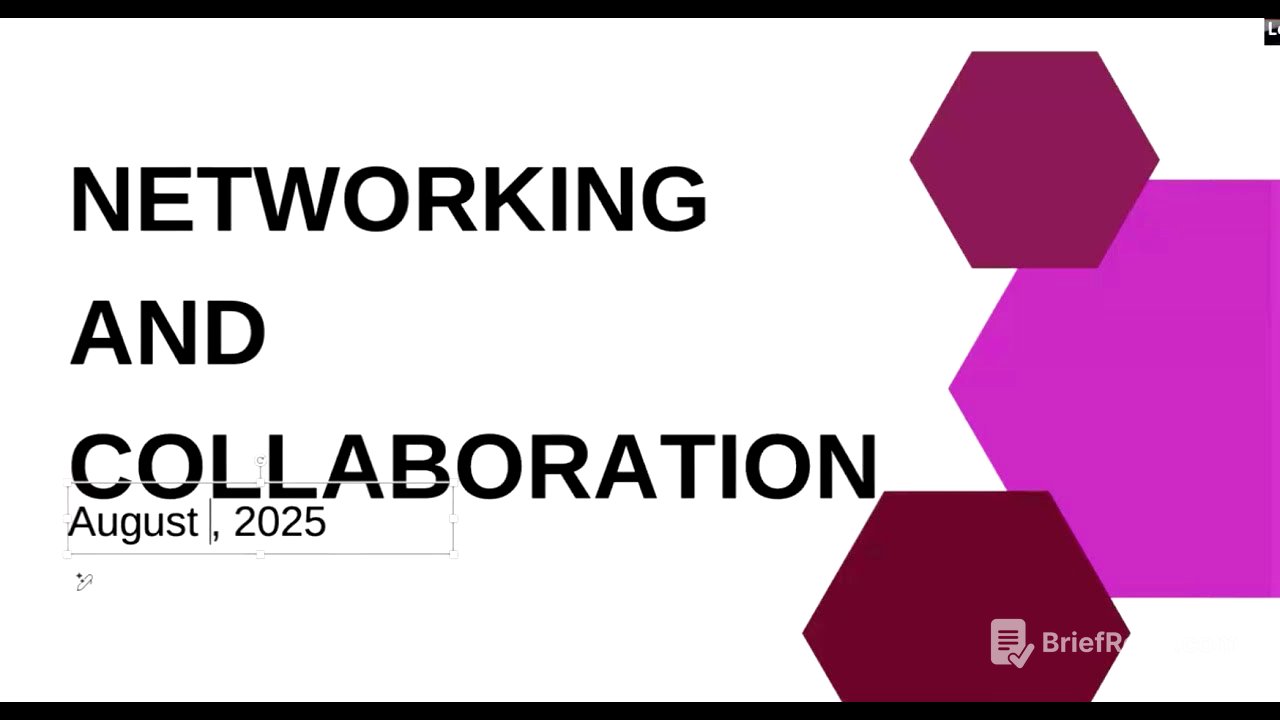TLDR;
This video explores the importance of networking and collaboration in both personal and professional contexts. It highlights key strategies for building and maintaining a professional network, developing collaborative skills, and navigating professional relationships. The video stresses the significance of authenticity, active listening, and providing value to others in networking and collaboration efforts.
- Networking involves building relationships and accessing opportunities.
- Collaboration requires teamwork, clear communication, and leveraging individual strengths.
- Authenticity, active listening, and providing value are crucial for effective networking and collaboration.
Introduction to Networking and Collaboration [3:23]
Networking is about establishing and nurturing relationships with professionals, industry peers, mentors, and potential collaborators. It helps individuals and businesses gain opportunities, share knowledge, and support each other's growth. Effective networking can be done online and offline through social media, conferences, seminars, or casual meetups, with in-person networking often being more impactful. Key aspects include building genuine connections, accessing opportunities like job prospects and advice, exchanging knowledge, and providing mutual support.
Collaboration involves working together, pooling resources, and combining skills to achieve a shared goal. In business, this can occur within teams, across departments, or between external partners, driving innovation, productivity, and problem-solving. Key aspects of collaboration include teamwork, which requires diverse backgrounds and shared responsibility; clear and consistent communication; diverse perspectives leading to innovative solutions; and shared success where all parties benefit.
The Link Between Networking and Collaboration [9:00]
Networking and collaboration are closely linked, with networking enabling collaboration by creating opportunities to meet individuals with diverse skills and knowledge. Building a network allows for future collaboration. Successful collaborations strengthen networks, leading to more trustworthy professional relationships and expanding your network. Your network determines your net worth.
How to Effectively Network [9:53]
To network effectively, be clear about your goals and focus on building genuine relationships rather than just collecting contacts. Engage actively by attending networking events, initiating conversations, and showing genuine interest in others. Be proactive in asking questions and listen actively with your heart and intellect. Leverage social media platforms to connect with people in your industry, share your expertise, and engage in meaningful conversations. Follow up with contacts after networking events to solidify connections and maintain relationships by periodically sharing valuable resources. Always think about how you can provide value to others through advice, resources, or mentoring.
How to Effectively Collaborate [15:11]
To collaborate effectively, establish clear goals and roles, ensuring all parties understand the shared objectives and responsibilities. Encourage open communication where everyone feels comfortable sharing ideas and providing feedback, using tools like Slack or Microsoft Teams to keep everyone aligned. Leverage each person's strengths by identifying and utilising their expertise to contribute to the project's success. Be open to learning from others and consider diverse perspectives to solve problems creatively, maintaining humility and recognising that everyone has different learning styles and ways of processing information.
Be consistent, flexible, and adaptable, being prepared to make adjustments when challenges arise. Set clear expectations and deadlines, agreeing on milestones and key deliverables from the start, and do regular check-ins to ensure progress. Celebrate successes together by acknowledging and recognising everyone's achievements, fostering motivation and strengthening relationships. After completing the collaboration, reflect on what worked well and areas for improvement for future projects.
Tips for Effective Networking and Collaboration [20:26]
For effective networking and collaboration, be authentic, as people appreciate sincerity and genuine connections are more valuable. Practice active listening by being attentive and really hearing what others are saying, both verbally and nonverbally. Be patient and consistent, as building a strong network and effective collaborations takes time and persistence.
Closing Task [22:14]
Reflect on your networking and collaborative experiences, considering what worked well, what didn't, and what challenges you faced. Think about the key skills or strategies that helped you succeed and identify areas where you could improve in the future.









